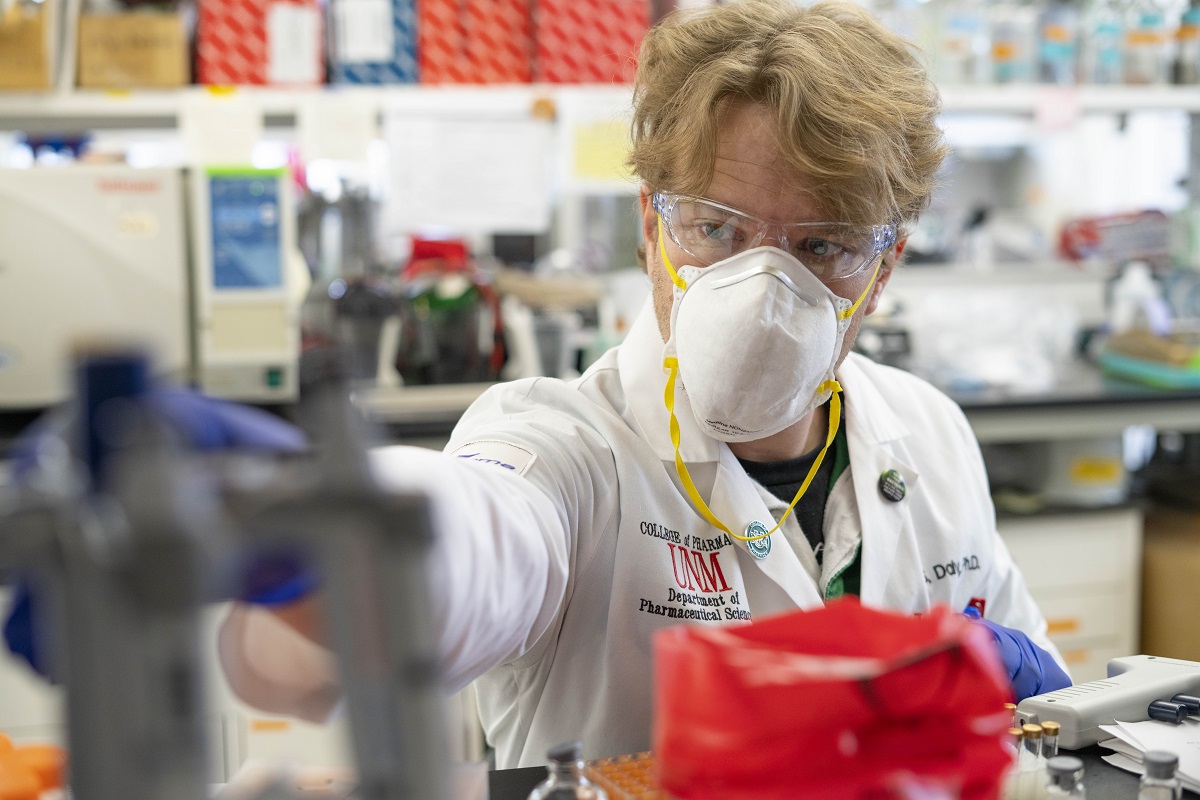
Students in this concentration will conduct research studies under the mentorship of a faculty member, or an affiliated faculty member, of the Department of Pharmaceutical Sciences, an academic department of the University of New Mexico College of Pharmacy and members of METALS Superfund Research Program Center. The department is dedicated to the advancement of knowledge and understanding of pharmacology, toxicology, and the pharmaceutical sciences and to the comprehensive education and training of students in the pharmaceutical sciences. The flexible curriculum will enable students to conduct investigations in the fundamental areas of pharmaceutical sciences, focusing on two main areas of study; 1) Pharmaceutics and 2) Pharmacology/Toxicology. The concentration is designed to offer required and elective courses as well as professional career development that is relevant to all programs, yet with sufficient flexibility to enable trainees to focus on selected areas of interest.
Note that not all courses are offered every semester. Students should contact the Instructor of Record (IOR) of electives in advance to determine which semester a course will be offered. BSGP graduate students studying with faculty in the Department of Pharmaceutical Sciences but not interested in pursuing the concentrations are expected to enroll in the PHRM 593 seminar course a minimum of two semesters.

The concentration in Pharmaceutical Sciences conforms to the basic requirements of the BSGP degree programs. Students in this concentration will conduct research studies under the mentorship of a faculty member, or an affiliated faculty member, of the Department of Pharmaceutical Sciences, an academic department of the University of New Mexico College of Pharmacy. The department is dedicated to the advancement of knowledge and understanding of pharmacology, toxicology, and the pharmaceutical sciences and to the comprehensive education and training of students in the pharmaceutical sciences. In recognition of the need for greater interdisciplinary and transdisciplinary graduate training, the Pharmaceutical Sciences concentration has been developed to allow students to articulate individualized training goals and plans for targeted career development. The flexible curriculum will enable students to conduct investigations in the fundamental areas of pharmaceutical sciences, focusing on two main areas of study; 1) Pharmaceutics and 2) Pharmacology/Toxicology. The concentration is designed to offer required and elective courses as well as professional career development that is relevant to all programs, yet with sufficient flexibility to enable trainees to focus on selected areas of interest.
Note that not all courses are offered every semester. Students should contact the Instructor of Record (IOR) of electives in advance to determine which semester a course will be offered. BSGP graduate students studying with faculty in the Department of Pharmaceutical Sciences but not interested in pursuing the concentrations are expected to enroll in the PHRM 593 seminar course a minimum of two semesters.
To earn a Concentration in Pharmaceutical Sciences graduate students are required to take the following:
|
Course No. |
Course title |
Credit hrs |
|
|
REQUIRED |
|
| Molecular and Cellular Pharmacology |
3 |
|
|
|
|
|
|
|
Complete at least 2 of the following: |
|
|
Principles of Neurobiology |
3 |
|
|
Physiology |
3 |
|
|
Immunobiology |
3 |
|
|
Cancer Biology |
3 |
|
|
Fundamentals of Medical Imaging |
3 |
Following successful completion of the Qualifying Exam and remaining in Good Academic Standing (as defined by the BSGP), graduate training will mainly focus on laboratory research supervised by the student's mentor, and supplemented with the following advanced courses:
| Course No. |
Course title |
Credit hrs |
|
|
REQUIRED |
|
|
|
Earn at least 6 credits of the following: |
|
| Pharmaceutical Sciences and Toxicology Seminar |
6 |
|
|
|
|
|
|
|
Earn at least 9 credits from the following: |
|
| PHRM 536 |
Introduction to Pharmacogenomics |
2 |
| PHRM 549 |
Regulatory Issues in Clinical Trials |
2 |
| General Toxicology | 3 | |
| Topics in Environmental Disease | 1-3 | |
| Research Problems in Pharmaceutical Sciences | 1-6 | |
| Topics in Pharmaceutical Sciences | 1-3 |
If PHRM 598 is chosen, acceptable titles are Pharmaceutical Sciences and Host-Pathogen Journal Club; courses can be taken for 1-4 credits. Other graduate courses relevant to the student's area of study recommended and approved by the Committee on Studies may also be used to satisfy the above requirement.
Mailing Address
School of Medicine Research Education Office
MSC08-4560
1 University of New Mexico
Albuquerque, NM 87131
Phone: (505) 272-1887
Fax: (505) 272-8738
Email: SOMREO@salud.unm.edu
Physical Location:
UNM Health Sciences Center (North Campus)
Reginald Heber Fitz Hall (Building 211)
Room B61